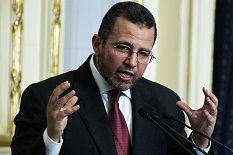By Sara Aggour and Doaa Farid

The ongoing political crisis has damaged the economy in many ways. As successive cabinets struggle with restoring non-existent security, which scared away investors and tourists, economic ministries were inevitably sucked into the political turmoil, resulting in several short-lived cabinets and a hazy financial vision.
Since the 2011 revolt which toppled the 30-year rule of Hosni Mubarak, and following mass protests demanding economic reforms to secure better living conditions, Egypt has witnessed five prime ministers, who introduced a minimum of seven changes to the cabinet.
The latest of such alterations occurred following 30 June, when former president Mohamed Morsi was ousted. A military-backed interim cabinet headed by Hazem El-Beblawi, a former finance minister, was formed to handle the hefty task of reviving the economy that has decelerated to 2.3% in the first nine-months of 2012, according to World Bank figures, compared to 6% prior to Mubarak’s ouster.
As the political aftermath of Morsi’s ouster continues to unfold, Egypt’s new leaders vowed not to exclude his Muslim Brotherhood or other Islamist parties. However, officials who were appointed in economic ministries during Morsi’s one-year rule, whether they came from such partisan backgrounds or not, were shortly dismissed or willingly resigned, underscoring the politicising of the economic sector.
Surprising sacking
Shortly after his appointment, Finance Minister Ahmed Galal issued a statement announcing his decision to “reform the minister’s technical bureau consistent with the ministry’s goals for the upcoming period.”
According to media reports and sources, at least 15 ministerial advisors were dismissed for being affiliated with the Brotherhood.
Ahmed Al-Nagar, former advisor at the ministry for sukuk, said his dismissal “was surprising.” He added that the decision was announced following a meeting with the minister in which the Islamic bonds’ first draft was discussed as well as progress made since Al-Nagar’s appointment in January.
Furthermore, Mohamed Mekkawy, former advisor at the Ministry of Foreign Affairs, attributed his firing to the “political affiliations of the advisors.”
Mekkawy said that the department he was responsible for was inactive for almost a year and a half and that he succeeded in reviving the division as well as added youthful qualified calibers to their team.
“The Minister has previously announced that there will not be any politically-based exclusion but his decisions contradicted these previous statements,” Mekkawy said, adding that he was informed of his dismissal in a “letter.”
Meanwhile, Ebtessam Saad, the minister’s media advisor, said: “the discharge of the advisors was based on qualifications and to restore the legal mechanism in the ministry.”
Refuting reports that the total number of dismissed advisors to be 15 as, “exaggerated,” Saad explained “there were more than the required number of legal advisors so we needed to discharge some members.”
As for the Ministry of Investment, Al-Borsa Daily reported early in July that security men were asked to keep out advisors of former minister, Yehia Hamed, who was a member of the Brotherhood, after he submitted his resignation on 2 July.
Shortly afterwards, the same newspaper said advisors serving under Yehia’s predecessor returned to their posts.
Repeated mistakes

Fakhri El-Fekki, professor at the Faculty of Political Science and Economy, warned against repeating the “same mistakes made by the ousted government.”
“Morsi’s government was accused of excluding qualifications based on political stances, as well as seeking to empower political Islamists through appointing them in leading positions. What the new government must do is to learn from previous mistakes and avoid them,” he said.
Given that the new government is technocratic and has set the economy revival as a paramount goal, qualifications must be kept regardless of political affiliation, he explained.
The recent appointment of Hesham Ahmed Okasha as head of the country’s biggest public lender, National Bank of Egypt (NBE), has also underlined the influence of politics on hiring executives. According to some local media outlets, NBE remained without a chairman for six months as the appointment of Okasha was withheld for outspokenly criticising the Brotherhood.
“Anti-Coup” resignations
At the Ministry of Supply, officials’ departures were also driven by political purposes, but were optional as they resigned rather than be dismissed.
Nasser El-Farash, the former spokesman of the Ministry of Supply said at least five advisors quit their jobs “after the coup.”
He said: “we refused to remain in our positions after the coup so we decided to resign.”
Several calls made to the ministry’s media office for comments were unanswered.
Discussing the negative impacts of such changes in ministries’ structures, El-Fekki said that since 2011, each alteration meant strategies adopted by outgoing officials were shelved and new policies were adopted. “Such inconsistency is not in the best interest of an already ailing economy,” he said.
Egypt’s main source of foreign currency, tourism and foreign direct investment, was hurt by constant protests and political uncertainty, causing a rapid depletion in foreign reserves, which in turn prompted the government to rely more on lending to finance imports.
According to latest statistics on the central bank’s website, net foreign reserves rose to $18.88bn, bolstered by Arab Gulf aid to cash-strapped Egypt. It is still significantly lower than levels recorded prior to the 2011 revolt which were more than $30bn.
“It is incomprehensible why the current government, headed by an economic expertise such as El-Beblawi and includes a number of similar figures, are more engrossed in discussing politics than economy,” El-Fekki said. “Egypt’s economy needs much more focus than they’re presenting.”




